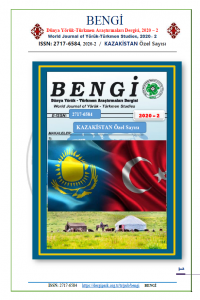Öz
Kaynakça
- Belton, Daniel & Ebbert, Ashley & Infurna, Frank. (2016). Social Intelligence.
- Gardner, H. (1999). Intelligence reframed: Multiple intelligences for the 21st century. New York, NY: Basic Books.
- Goleman, D., & Boyatzis, R. (2008). Social intelligence and the biology of leadership. Harvard Business Review, 86(9), 74–81.
- Moss, F. A., Hunt, T., Omwake, K. T., & Woodward, L. G. (1955). Manual for the George Washington University Series Social Intelligence Test. Washington, DC: Center for Psychological Service.
- Thorndike, E. L. (1920). Intelligence and its use. Harper’s Magazine, 140, 227–235.
- Vernon, P. E. (1933). Some characteristics of the good judge of personality. Journal of Social Psychology, 4, 42–57.
- Sternberg R., Kaufman S. B. (2011). The Cambridge Handbook of Intelligence.
Öz
The article considers the issue of priority of social intelligence in the university space. For the future pedagogue, social intelligence is a key factor in achieving success. Therefore, the problems of the development of social intelligence in the educational space should be considered taking into account the personal characteristics of students. Thus, the article reveals the reason for choosing generation Z as the main participants in this process, and also offers recommendations on the organization of the educational process in pedagogical specialties.
Anahtar Kelimeler
social intelligence interaction educational process generation Z society emotional intelligence
Kaynakça
- Belton, Daniel & Ebbert, Ashley & Infurna, Frank. (2016). Social Intelligence.
- Gardner, H. (1999). Intelligence reframed: Multiple intelligences for the 21st century. New York, NY: Basic Books.
- Goleman, D., & Boyatzis, R. (2008). Social intelligence and the biology of leadership. Harvard Business Review, 86(9), 74–81.
- Moss, F. A., Hunt, T., Omwake, K. T., & Woodward, L. G. (1955). Manual for the George Washington University Series Social Intelligence Test. Washington, DC: Center for Psychological Service.
- Thorndike, E. L. (1920). Intelligence and its use. Harper’s Magazine, 140, 227–235.
- Vernon, P. E. (1933). Some characteristics of the good judge of personality. Journal of Social Psychology, 4, 42–57.
- Sternberg R., Kaufman S. B. (2011). The Cambridge Handbook of Intelligence.
Öz
Мақалада университет кеңістігінде әлеуметтік интеллекттің басымдығы туралы мәселе қарастырылған. Болашақ педагог үшін әлеуметтік интеллект - жетістікке жетудің негізгі факторы. Сондықтан білім беру кеңістігінде әлеуметтік зияткерлікті дамыту проблемаларын оқушылардың жеке ерекшеліктерін ескере отырып қарастырған жөн. Осылайша, мақалада Z буынының осы процестің негізгі қатысушылары ретінде таңдалу себебі анықталған, сонымен қатар педагогикалық мамандықтар бойынша оқу процесін ұйымдастыру бойынша ұсыныстар берілген.
Anahtar Kelimeler
әлеуметтік интеллект өзара әрекет оқу процесі Z буыны қоғам эмоционалды интеллект мұғалім
Kaynakça
- Belton, Daniel & Ebbert, Ashley & Infurna, Frank. (2016). Social Intelligence.
- Gardner, H. (1999). Intelligence reframed: Multiple intelligences for the 21st century. New York, NY: Basic Books.
- Goleman, D., & Boyatzis, R. (2008). Social intelligence and the biology of leadership. Harvard Business Review, 86(9), 74–81.
- Moss, F. A., Hunt, T., Omwake, K. T., & Woodward, L. G. (1955). Manual for the George Washington University Series Social Intelligence Test. Washington, DC: Center for Psychological Service.
- Thorndike, E. L. (1920). Intelligence and its use. Harper’s Magazine, 140, 227–235.
- Vernon, P. E. (1933). Some characteristics of the good judge of personality. Journal of Social Psychology, 4, 42–57.
- Sternberg R., Kaufman S. B. (2011). The Cambridge Handbook of Intelligence.
Ayrıntılar
| Birincil Dil | Rusça |
|---|---|
| Bölüm | Makaleler |
| Yazarlar | |
| Yayımlanma Tarihi | 14 Ağustos 2020 |
| Gönderilme Tarihi | 16 Haziran 2020 |
| Yayımlandığı Sayı | Yıl 2020 Cilt: 2020 Sayı: 2 - KAZAKİSTAN ÖZEL SAYISI |
Kaynak Göster
TELİF HAKKI VE YAZAR ETİK SÖZLEŞMESİ FORMU -COPYRGHT and AUTHOR ETHİCAL DECLARATİON
Telif Hakkı Devri Formu imzalanıp, (taratılıp veya resim jpg. vs olabilir) makale başvuru esnasında Dergi sistemine yüklenmelidir.
This Copyright Agreement Form must be signed by all authors and uploaded to the Journal system (It can be scanned and sent as an image, jpg, etc.).


